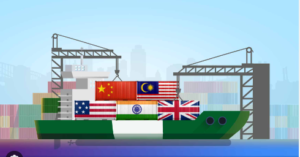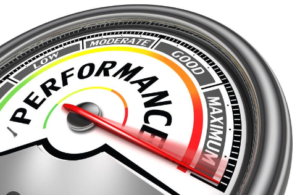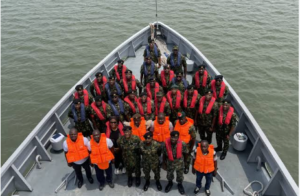Despite the country’s ports handling more than 85 percent of its import trade worth more than $15 billion a year, poor infrastructure, including epileptic power supplies, has hindered its full potential.
With a coastline of 852 kilometers in the Atlantic Ocean in the Gulf of Guinea and a water surface of more than 46,000 km2, Nigeria is undoubtedly a great maritime destination.
While the cost of doing business in other ports is low, many costs prompt investors to change their business interests.
prof. Eugene Nweke, a shipping expert and former president of the Nigerian Association of Shipping Agents (NAGAFF), said in a telephone conversation with our correspondent that the cost of shipping to the country. The Nigerian language also affects the cost of doing business.
Dr. Nweke said the shipping cost for a 40ft container from China to Nigeria is about $8,500, while Ghana and Lome are $3,500 and $3,000 respectively.
On the import and export of goods at the port, he said the number of imported goods that were physically examined was 68.7 percent.
“Over the insurance premium, the insurance premium is 1.5 percent versus Europe, Asia, and America 0.55 percent. A poor transportation network results in the high cost of doing business in seaports and the overall cost of goods and services.
“High shipping industry and terminal handling costs (THC). Annual freight costs are between $5 and $6 billion, while export production and customs clearance are on the high side compared to neighboring countries,” he added.
Economic Gateway

Despite the enormous challenges, however, the country’s ports serve as a major economic gateway, handling about 85 percent of the goods entering Nigeria.
Nigerian port statistics released by CEIC show container production was 1,566,109,000 TEU in December 2021. This shows an increase from the previous figure of 1,548,622,000 TEU for December 2020. The data shows a record high of 1,867,000 TEU less than 1,867,4009. 72,500,000 TEU in 2008.
Similarly, statistics from the National Bureau of Statistics (NBS) show that cargo traffic in the ports totaled 71,903,266 tons in 2017, up from 70,819,082 tons in 2016.
This happened as a result of the 2006 Port Reform, which helped restructure and transform Nigerian ports for competitiveness and efficiency to compete with its partners in the West African region and even the rest of the world.
The process of port modernization stems from the desire of the then federal government to include the private sector in the port value chain by adopting PPP as part of the international business model.
The time spent in the port changed the activities of the NPA into a more technical process with the main responsibilities being the provision and maintenance of common user facilities such as internal roads of the port, electricity, transportation, ships, ships-low water, towing, and other technical assistants of safe navigation, in addition to overseeing regulatory control over terminal operators.
Monitor drive performance

prof. However, Nweke said it seems like the public understanding of the limits of the NPA’s role in the station has a widespread perception that all stations are under the NPA when in fact there are other government agencies such as the Nigerian Customs Service. Work
under the purview of a power holding company and recently the Shippers Council as the economic regulator.
He explained that while the Authority had undergone a reform process that radically changed its processes and procedures, most of the other agencies of government are yet to effect similar reforms, adding that this lack of changes at the same pace has had a huge impact on port operations.
Maritime expert Nwachukwu Kelechi clarified that “contrary to misconceptions and false narrative in a section of the media, the NPA is solely responsible for the development and maintenance of port access roads within the port and not roads outside the seaports. Maintenance and development of access to the hinterland is the responsibility of the government.”
Stakeholders laud NPA

However, stakeholders have commended the current management of the NPA for executing its constitutional roles and responsibilities. For instance, the NPA was recently commended for its role in strengthening security architecture inside the ports.
According to the European Union (EU), the current management has taken its role seriously by reducing vulnerabilities, risks and increasing skills and vigilance at the ports.
The EU, through Nico Vertogen, said “There is a huge improvement in Nigeria’s port security architecture and that was very reassuring for us to notice. But there can always be improvement by doing more training, but in general, the situation is good.
Port users, especially clearing agents, also applauded the NPA management for keying into the core responsibilities and roles of the agency.
The NPA has also engaged the International Maritime Organization (IMO) in the development of a Port Community System for the automation and digitization of the port processes.
As if to confirm the effectiveness of these collaborations, last week the Lagos State Police Command arrested 15 hoodlums, 3 Police Officers, 1 LASTMA and 1 FRSC personnel caught aiding and abetting extortion. This is coming on the heels of the reception at the NPA headquarters of Mr. Idowu, the Commissioner for Lagos, where Bello Koko enlisted the Commissioner’s support to frontally tackle the menace of corruption which, according to Koko, is “doing reputational damage to Nigeria, given that the ports access road is an international business corridor.”

